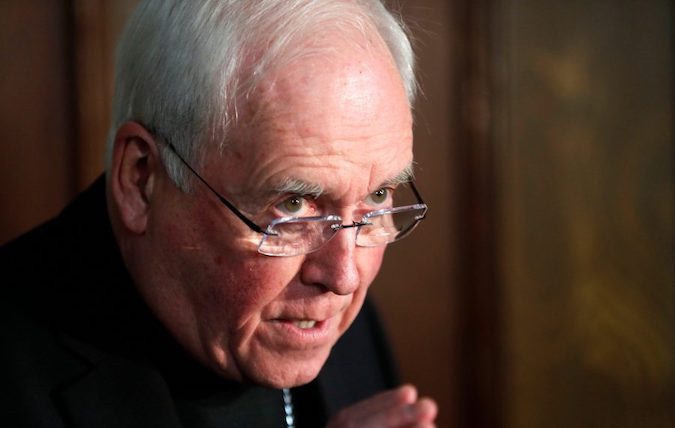Things aren’t looking great for Bishop of Buffalo Richard Malone. A federal grand jury is investigating his diocese’s handling of clerical sexual abuse cases. That on top of the ongoing, state-wide investigation of New York’s eight Catholic dioceses being conducted by the state’s attorney general. And then there are the scores of civil suits filed recently under the Child Victims Act, seeking damages in cases previously beyond the statute of limitations. It seems likely that an ecclesial investigation of Bishop Malone will be next.
Questions about Bishop Malone’s handling of abuse have been in the news since last year, when a former assistant released a trove of documents showing the diocese dissembling – that’s being charitable – in its handling of several cases. Malone, for his part, has acknowledged making mistakes and apologized: “My handling of recent claims from some of our parishioners concerning sexual misconduct with adults unquestionably has fallen short of the standard to which you hold us, and to which we hold ourselves.”
But Bishop Malone has also, thus far, insisted that he will not resign – not so long as he believes that he has the support of his flock. “The shepherd,” he says, “does not desert the flock at a difficult time.” In recent weeks, Malone’s already precarious situation has become even more so.
In August, two seminarians announced they were leaving Buffalo’s Christ the King Seminary over concerns about the harassment of seminarians. One of those seminarians, Matthew Bojanowksi, had reported to Bishop Malone that a local diocesan priest, Fr. Jeffrey Nowak, had sexually harassed him. The allegations against Fr. Nowak also included breaking the seal of Confession.
We know that Bishop Malone was aware of Bojanowski’s allegations against Nowak. Indeed, we know that Malone believed the allegations against Nowak. We know this because Bishop Malone’s own secretary, Fr. Ryszard Biernat, secretly recorded conversations with Malone in which the bishop said as much: “The simple version here is we’ve got victims and we have a perpetrator, and the perpetrator is Jeff Nowak, and he’s done things that are clearly wrong, and I think he’s a sick puppy.”
But if Bishop Malone believed Fr. Nowak was a problem, why did he leave him in his parish? The diocese maintains that it “never received – and still has not received – any allegation that Fr. Nowak ever engaged in sexual contact with anyone, child or adult.” The allegations that Nowak violated the confessional seal also remain “unproven,” according to the diocese.
But what of the allegations of sexual harassment against Nowak?
As it happens, Malone had another reason for waiting so long to take action against Nowak. It turns out that Fr. Nowak was able to produce evidence – a “love letter” – that strongly suggests Fr. Biernat (Malone’s secretary) was romantically involved with the same seminarian (Bojanowksi) who had accused Nowak of sexual harassment.

Fr. Biernat and Bojanowski, through their attorney, insist that there is nothing untoward in their relationship – they’re just friends – and that talk of a “love triangle” is “a complete deflection.”
But the letter from Biernat to Bojanowski doesn’t exactly read like a platonic friendship between adult men:
Remember? The library of the bishop’s house? I hesitated at first in saying that I trully [sic] love you. What I have been feeling for you is something totally new and different from all the other feelings of love I have experienced.
Bishop Malone, meanwhile, has said that he is, “not aware at this time of any allegations of sexual impropriety between Father Ryszard [Biernat] and Matthew [Bojanowksi].” That may well be true, technically. Given the suggestive contents of Biernat’s letter, one can understand why Bishop Malone might want to proceed with the utmost caution and delicacy.
The explanation of the situation, which the diocese offered in a statement last week, essentially makes this point:
[B]ecause it was apparent that the publicity around the Fr. Nowak investigation might lead to the publication of a letter written by Bishop Malone’s Secretary, Fr. Ryszard Biernat, to a seminarian, Bishop Malone suggested that Fr. Biernat take a personal leave of absence from his assignment as the Bishop’s Secretary and Vice Chancellor. Bishop Malone’s motivation for this suggestion was in the hope that such a move might avoid embarrassment to Fr. Biernat and the diocese.
Now, no bishop wants it going around that his priest secretary has been romantically involved with a seminarian – still less a seminarian who has lodged sexual harassment complaints against a third priest who was still in ministry. If Bishop Malone hoped to avoid embarrassment and scandal, he has failed miserably. After months of delay, and elaborate attempts to protect his diocese and his secretary – and let’s be honest, himself – from embarrassment, Bishop Malone has only managed to make matters worse.
So where do things stand now? On August 18, Bishop Malone convinced Fr. Biernat to take a leave of absence. It was two days later that Bojanowski announced he was leaving the seminary, citing Malone’s failure to take prompt action against Nowak. After repeatedly ordering Fr. Nowak to St. Luke Institute for personality assessment over the summer, and after Nowak repeatedly refused, Malone finally placed him on administrative leave on August 28.
Last week, Fr. Biernat told the press that he had been sexually abused himself when he was a seminarian, had reported the abuse, been stonewalled by the diocese (before Malone was bishop, for what it’s worth) and had his path to ordination threatened.
Whatever else comes of the situation in Buffalo, Bishop Malone has demonstrated what by now should be an iron law of ecclesiastical governance: The price the Church pays for trying to save face is, in the end, always greater than the up-front cost of transparency.
Meanwhile the faithful in the pews, including far too many abuse survivors, watch circuses like the one in Buffalo and ask, “How long, O Lord?”














